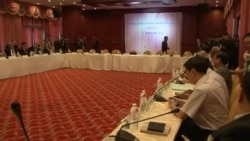BANGKOK —
A day after Thailand's army chief declared martial law, he gathered top politicians and protest leaders for talks in Bangkok. The talks are intended to try to break the six-month political deadlock that continues to damage the country’s economy.
Prominent political figures were summoned Wednesday afternoon for closed-door talks at the Army Club by General Prayuth Chan-ocha.
The military says the talks were serious but conducted in a friendly atmosphere. An army spokesman says all the stakeholders were given "homework" by the military and asked to return for a second round of discussions Thursday.
The day after the army chief declared martial law, there was scant evidence of troops on Bangkok’s streets, a contrast from the previous day when there were numerous checkpoints in and outside the capital.
One significant difference after the implementation of martial law: a muting of Thailand’s media. At least 14 satellite TV stations and hundreds of small radio stations were taken off the air. At the remaining news stations, soldiers now monitor content.
The pro-government red shirts, camped just west of the capital, have reiterated they will not remain passive if the caretaker cabinet is ousted.
At the anti-government rally site, near key government buildings, the army’s headquarters and the U.N.’s largest regional office, there was no military presence. As was the case before martial law, guards of the People’s Democratic Reform Committee control access.
PDRC leader Suthep Thaugsuban, a former deputy prime minister, vows his supporters will break camp only when the government is rid of the influence of the powerful Shinawatra family, whose political parties have won every election since 2001.
That record is why anti-government protesters such as freelance photographer (from Pattalung province) Sathit Yoddecha oppose another vote. Instead, they want an unelected council to change Thailand’s political system.
“Elections aren’t our goal. It would only mean the same group would come back to power. We don’t want that. Elections will lead the country down the same path and it’s not a good path. We don’t want to walk down that path anymore which has hurt us and the country," said Thaugsuban.
Thailand’s economy shrank by more than two percent in the first quarter of the year. And even before the declaration of martial law the government cut its economic growth forecast for the entire year. An extended period of martial law or another coup would almost certainly give pause to many more investors and tourists
Prominent political figures were summoned Wednesday afternoon for closed-door talks at the Army Club by General Prayuth Chan-ocha.
The military says the talks were serious but conducted in a friendly atmosphere. An army spokesman says all the stakeholders were given "homework" by the military and asked to return for a second round of discussions Thursday.
The day after the army chief declared martial law, there was scant evidence of troops on Bangkok’s streets, a contrast from the previous day when there were numerous checkpoints in and outside the capital.
One significant difference after the implementation of martial law: a muting of Thailand’s media. At least 14 satellite TV stations and hundreds of small radio stations were taken off the air. At the remaining news stations, soldiers now monitor content.
The pro-government red shirts, camped just west of the capital, have reiterated they will not remain passive if the caretaker cabinet is ousted.
At the anti-government rally site, near key government buildings, the army’s headquarters and the U.N.’s largest regional office, there was no military presence. As was the case before martial law, guards of the People’s Democratic Reform Committee control access.
PDRC leader Suthep Thaugsuban, a former deputy prime minister, vows his supporters will break camp only when the government is rid of the influence of the powerful Shinawatra family, whose political parties have won every election since 2001.
That record is why anti-government protesters such as freelance photographer (from Pattalung province) Sathit Yoddecha oppose another vote. Instead, they want an unelected council to change Thailand’s political system.
“Elections aren’t our goal. It would only mean the same group would come back to power. We don’t want that. Elections will lead the country down the same path and it’s not a good path. We don’t want to walk down that path anymore which has hurt us and the country," said Thaugsuban.
Thailand’s economy shrank by more than two percent in the first quarter of the year. And even before the declaration of martial law the government cut its economic growth forecast for the entire year. An extended period of martial law or another coup would almost certainly give pause to many more investors and tourists






